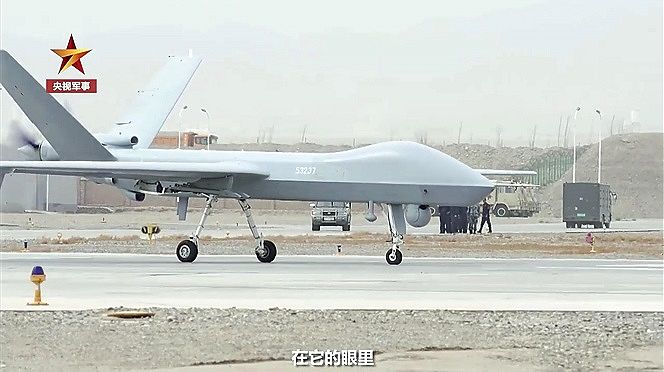Yuya Yokobori

On Sept. 29, Japan and China marked the 50th anniversary of the normalization of their diplomatic relations in 1972. Going forward, how should Japan deal with a China that has risen as an economic and military power and has been behaving in an increasingly coercive manner?
On Sept. 20, China Central Television aired a report on the activities of a military drone unit in a desert area in China’s northwestern region, featuring the Wing Loong-2, an 11-meter-long unmanned aerial vehicle (UAV) with a roughly 20-meter wingspan and a range exceeding 1,000 kilometers, according to the Chinese Air Force.
It was believed to be the first time China’s state-run media had reported details about the drone unit, which was shown striking ground vehicles with the UAV’s onboard missiles.
“We aim to be an elite unit for reconnaissance and combat missions,” the drone unit’s leader said.
The term “intelligent warfare” describes a modern form of war in which advanced technologies such as artificial intelligence and quantum technology are utilized.
During the Chinese Communist Party’s National Congress in 2017, Chinese President Xi Jinping called on his country to “speed up development of intelligent military,” which attracted attention to the concept of intelligent warfare.
China’s goal is thought to be the realization of unmanned battlefields by utilizing AI-equipped systems that assist commanders in decision-making, and unmanned weapons.
“They want to achieve victory without war by killing heads of state and military commanders, destroying infrastructure, and disorienting society to make people lose the will to fight,” said Prof. Jun Yasuda of Keio University, who has supervised the translation of a book about intelligent warfare by a Chinese military officer.
Yasuda believes the acceleration of drone development by the Chinese military is part of such a strategy.
In late August, the Chinese military’s TB-001 reconnaissance and strike drone flew over an area between the islands of Okinawa and Miyako in Okinawa Prefecture, before entering air space over the Pacific Ocean.
“Twenty years ago, Chinese fighter jets were old and had short flight ranges. In such a short space of time, we’ve been overtaken,” lamented an Air Self-Defense Force source.
In 1972, when Japan and China normalized diplomatic ties, Beijing was wary of the possibility of a large number of Soviet tanks crossing into Chinese territory. The Chinese Army was making slow progress in its modernization and its navy and air force were even more vulnerable.
The Taiwan Strait crisis of 1995-96 was a turning point. It is said that the humiliation of not being able to prevent a U.S. Navy carrier strike group from passing through the strait was the trigger for China to modernize its military.
Since then, China’s defense budget has continued to increase amid the country’s rapid economic growth. In 2022, China’s defense budget ballooned to about ¥30 trillion, five times that of Japan’s.
Xi has set a goal of modernizing the Chinese armed forces by 2035 and building a world-class military by the middle of this century, eying unification with Taiwan.
The Chinese military has rapidly introduced cutting-edge technologies, such as AI-equipped drones that can navigate autonomously in a swarm.
According to Japan’s 2022 defense white paper, China succeeded in simultaneously flying 200 drones in 2018. The annual defense document warned that military actions using swarm flights “would be difficult to counter with conventional air defense systems.”
The Japanese government is being urged to address the issue as a matter of urgency, as the possibility of a swarm attack on the Self-Defense Forces or U.S. military bases in Japan cannot be ruled out.
Research to improve interception capabilities by shooting down drones with high-power lasers and microwaves will begin in fiscal 2023, and the deployment of attack drones will be expedited.
“China believes autonomous and unmanned weapons will be effective in securing its maritime interests and unifying Taiwan,” Yasuda said. “In cooperation with the United States and other countries, Japan must accelerate the development of new kinds of weapons.”
No comments:
Post a Comment